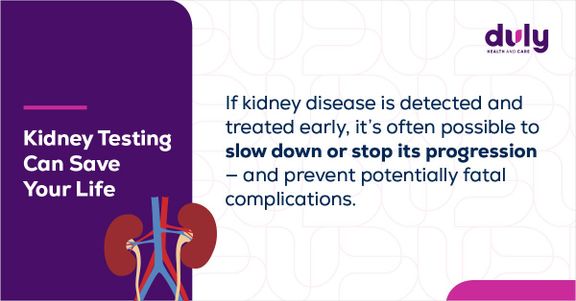Every minute of the day, your kidneys are hard at work.
The kidneys — two bean-shaped organs that sit just below your rib cage — filter waste and excess water out of your blood to create urine. When they’re functioning correctly, they filter about half a cup of blood per minute. However, when your kidneys don’t work properly, waste collects in your body, making you sick. If kidney disease gets worse, it can progress into kidney failure — a disease that’s fatal if not treated.
While kidney disease can’t be reversed, it can often be treated if it is found in its earliest stages. Unfortunately, since kidney disease usually doesn’t cause symptoms early on, many people only learn they have it once it has progressed to an advanced state. In fact, 9 out of 10 people who are living with kidney disease aren’t aware of it.
The only way to know if your kidneys are healthy is to get tested. Your provider may recommend a kidney test if you have:
- A condition that puts you at high risk for kidney disease, like high blood pressure, diabetes, or heart disease
- A family history of kidney failure
- Symptoms of kidney problems, like blood in your urine, frequently having to urinate, or pain with urination

Also read: Which Health Conditions Could Put Me at Higher Risk for Heart Disease?
Urine Tests: Do You Have Signs of Kidney Disease?
Your urine reveals a lot about what’s happening inside your body, from dehydration to infections to pregnancy. It also offers a look into the state of your kidneys. Damaged kidneys may leak a protein called albumin into your urine. Having albumin in urine (albuminuria) may be one of the first signs that you’re suffering from kidney disease.
Providers can check for albuminuria in one of two ways:
Dipstick Test
The dipstick urine test is simple: You give a urine sample at your provider’s office or lab, and the provider places a dipstick (a chemically treated strip of paper) into the sample. If the level of albumin in your urine is above what’s considered normal, the dipstick changes color.
This is just the first step. While it tells your provider if you have high albumin levels, it doesn’t give an exact measurement.
Urine Albumin-to-Creatinine Ratio
The urine albumin-creatinine ratio test goes more in-depth. It measures the amount of albumin in your urine, as well as the amount of creatinine (a normal waste product found in your urine), and compares the two numbers to calculate your urine albumin-creatinine ratio (uACR). A normal test result is a uACR of 30 or lower. Anything above that could indicate that you have kidney disease or are at an increased risk for kidney failure, heart attack, or stroke.
24-Hour Urine Collection
A uACR test might be more complex than a quick trip to the lab. Your provider may need you to collect all of your urine for a full 24 hours so they can see how much albumin goes into your urine during that time. The 24-hour test is often used as a follow-up after an abnormal result from a test based on a single sample. It’s the most accurate way to measure the amount of albumin in your urine — but it’s not usually ordered right away since it’s not as convenient as a one-time test.
CALL TO ACTION/FEATURED TEXT: To learn more about kidney testing, schedule an appointment with a Duly Health and Care nephrologist or your primary care provider.
Blood Tests: How Are Your Kidneys Functioning?
Blood tests are another way to check kidney function. There are several types of blood tests, and you may need to have more than one. Three of the most common are serum creatinine, glomerular filtration rate, and blood urea nitrogen (BUN).
Serum Creatinine Test
Your kidneys are responsible for filtering creatinine — a waste product that your body makes naturally — out of your blood. A serum creatinine test measures how much creatinine is in your blood. If there is too much, it could be a sign that your kidneys aren’t filtering it out as well as they should — and that can indicate possible kidney disease. Because creatinine levels can vary based on your age, weight, diet, activity level, and other factors, there is no standard level to measure your results against, but a lower number is considered better.
Glomerular Filtration Rate Test
Because a serum creatinine test alone might not give enough information to clearly measure your kidney function, it is usually used along with additional tests, such as your estimated glomerular filtration rate (eGFR). The eGFR measures the amount of blood that your kidneys filter out each minute. Since it’s a complicated test, providers typically don’t measure your eGFR directly — they estimate it based on your serum creatinine, age, sex, height, and weight. A higher rate is better. While the definition of a “normal” test result varies based on age, a value of less than 60 is usually a sign that there’s a problem with your kidneys, and a value of less than 15 indicates kidney failure.
Blood Urea Nitrogen Test
Urea nitrogen is another waste product that your body makes naturally. A blood urea nitrogen (BUN) test checks how much urea nitrogen is in your blood. It’s normal to have a little bit of urea nitrogen in your blood. However, greater amounts could mean you have a condition disrupting kidney function. The amount that’s considered normal changes based on your age and sex, and typically increases as you get older. A BUN test is typically included in a Basic and Comprehensive Metabolic Panel ordered by your primary care physician during your annual physical. A BUN test doesn’t define kidney failure by itself. But if your result is higher than it usually is, and your creatinine levels are also high, you’re likely experiencing kidney failure.
Also read: Blood Work Basics: What to Know About Your Test
When Your Provider Needs More Information
Urine and blood tests are key for diagnosing kidney problems, but they don’t always tell the entire story. Your provider may want you to take other types of tests to further examine your kidneys or monitor existing problems. Some of the other tests you may need include:
- Blood pressure monitoring. High blood pressure can make kidney problems worse, and damaged kidneys have trouble regulating blood pressure.
- Imaging tests, like computerized tomography (CT) scans, magnetic resonance imaging (MRI), or ultrasounds. These tests create detailed images of your kidneys so your provider can look for signs of damage or disease and see how well blood flows to your kidneys.
- Biopsy. A biopsy is a procedure where your provider removes a small sample of kidney tissue to examine under a microscope for evidence of damage or disease.
The Next Steps After Kidney Testing
If you find out that you have kidney disease, it’s critical to start treatment as soon as possible and keep up with all of your check-ups. The earlier you begin treatment, the greater your likelihood of keeping it from getting worse. And if you can prevent it from getting worse and you continue treatment, you may still be able to live a long life — and keep up your quality of life.
Health Topics:







